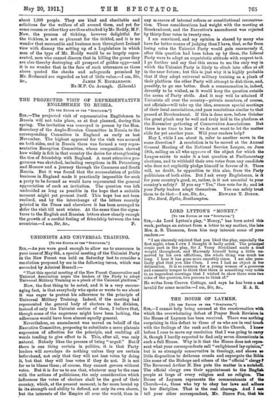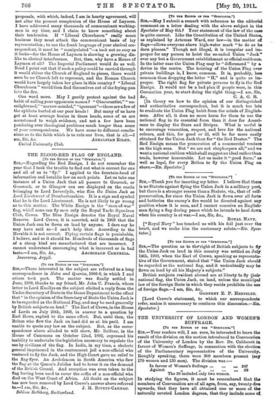THE HOUSE OF LAYMEN.
ITO TES EDITOR or TEN " Srscuroz."J Srs,—I cannot help being amused at the consternation with which the overwhelming defeat of Prayer Book Revision it the House of Laymen has been received. There was nothing surprising in this defeat to those of us who are in real touch with the feelings of the rank and file in the Church. I knew before I rose to move my resolution that I was going to carry it, though I hardly expected to find only seven dissentients it such a full House. Why is it that the House does not repre- sent what your correspondents call " enlightened lay opinion," but is so strangely conservative in theology, and show• es little disposition to dethrone creeds and expurgate the Bible like some of the Bishops and others of the "official" clergy? The Reverend Arthur N. Bax puts the matter in a nutshell. The official clergy owe their appointment to the English people at large of every religion and no religion. The House of Laymen represents the communicants of the Church—i.e., those who try to obey her laws and adhere to her discipline. That is the real cleavage. And I con tell your other correspondent, Mr. Storrs Fox, that big
proposals, with which, indeed, I am in hearty agreement, will not alter the present complexion of the House of Laymen. I have addressed many thousands of communicant working- men in my time, and I claim to know something about their tendencies. If " Liberal Churchmen" really mean business they must attack the communicant basis of lay representation ; to use the frank language of your clerical cor- respondent, it must be " manipulated "—a task not so easy as it looks—for the House of Laymen is showing a growing dis- like to clerical interference. But, then, why have a House of Laymen at all ? The Imperial Parliament would do as well. Need I point out that if such a policy could be carried through it would shiver the Church of England to pieces, there would soon be no Church left to represent, and the Roman Church would have largely taken her place in this country P " Liberal Churchmen " would then find themselves out of the frying-pan into the fire.
One word more. May I gently protest against the bad habit of calling your opponents names P " Obscurantist," " un- enlightened," "narrow-minded," "ignorant"—these are a few of the epithets hurled at our poor heads ! But many of us have got at least average brains in these heads, some of ns are accustomed to weigh evidence, and not a few have been pondering over theological problems much longer than some of your correspondents. We have come to different conclu- sions as to the faith which is to rule our lives, that is









































 Previous page
Previous page